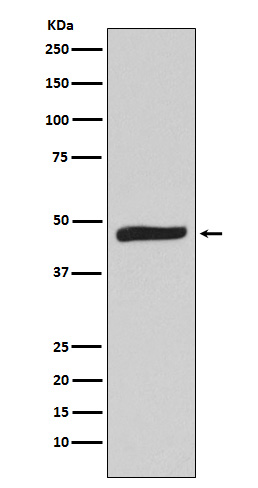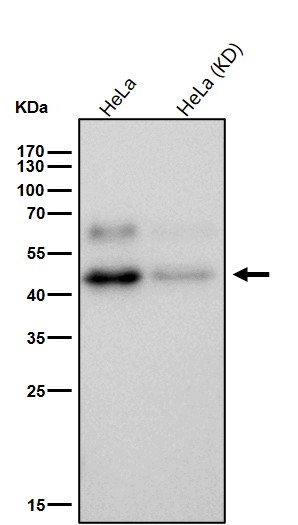

| WB | 咨询技术 | Human,Mouse,Rat |
| IF | 1/20-1/50 | Human,Mouse,Rat |
| IHC | 咨询技术 | Human,Mouse,Rat |
| ICC | 技术咨询 | Human,Mouse,Rat |
| FCM | 咨询技术 | Human,Mouse,Rat |
| Elisa | 咨询技术 | Human,Mouse,Rat |
| Aliases | MAPKAP K2; MAPKAP kinase 2; MAPKAPK 2; MAPKAPK2; Mitogen activated protein kinase activated protein kinase 2; MK 2;;MK2 |
| WB Predicted band size | 46 kDa |
| Host/Isotype | Rabbit IgG |
| Antibody Type | Primary antibody |
| Storage | Store at 4°C short term. Aliquot and store at -20°C long term. Avoid freeze/thaw cycles. |
| Species Reactivity | Human,Mouse,Rat |
| Immunogen | A synthesized peptide derived from human MK2 |
| Formulation | Purified antibody in PBS with 0.05% sodium azide,0.05% BSA and 50% glycerol. |
+ +
1. **"Role of MAPKAP kinase-2 (MK2) in inflammatory arthritis" by Kotlyarov et al.**
摘要:研究探讨了MK2在炎症反应中的作用,利用MK2基因敲除小鼠模型和特异性抗体验证其在TNF-α、IL-6等细胞因子调控中的关键功能,揭示其作为潜在抗炎治疗靶点的重要性。
2. **"MAPKAP kinase 2 phosphorylates the cell death regulator TRADD" by Huang et al.**
摘要:通过MK2特异性抗体进行免疫沉淀和Western blot分析,发现MK2通过磷酸化TRADD蛋白调控TNF-α介导的细胞凋亡信号通路,揭示了MK2在细胞应激反应中的双重作用。
3. **"A critical role of MAPKAP kinase 2 in tumor metastasis" by Shi et al.**
摘要:利用MK2抗体进行免疫组化和功能实验,证明MK2通过激活HSP27磷酸化促进肿瘤细胞迁移和侵袭,提示其作为癌症转移治疗靶点的潜力。
4. **"Selective inhibition of MAPKAP kinase 2: A strategy for controlling inflammation" by Gaestel et al.**
摘要:研究开发了一种MK2特异性抗体及小分子抑制剂,验证其在抑制LPS诱导的炎症因子释放中的作用,强调MK2抗体在炎症疾病机制研究中的工具价值。
以上文献均通过MK2抗体进行功能验证或机制研究,涵盖炎症、癌症及信号通路分析等方向。
MAPKAP kinase 2 (MK2), a serine/threonine protein kinase, is a downstream effector of the p38 mitogen-activated protein kinase (MAPK) pathway, which plays a critical role in cellular responses to stress, cytokines, and growth factors. Activated by p38α via phosphorylation at Thr334. MK2 regulates diverse processes, including mRNA stability, cytoskeletal reorganization, and inflammatory signaling. It is involved in phosphorylating substrates such as heat shock protein 27 (HSP27), cyclic AMP-responsive element-binding protein (CREB), and tristetraprolin (TTP), influencing cell survival, cytokine production, and stress adaptation.
MK2 antibodies are essential tools for studying its expression, activation, and subcellular localization. They enable detection of total MK2 protein or its phosphorylated form (active state) in techniques like Western blotting, immunofluorescence, and immunohistochemistry. These antibodies are widely used in research on inflammation, cancer, and neurodegenerative diseases, as MK2 dysregulation is linked to pathological conditions, including rheumatoid arthritis, tumor progression, and ischemia-reperfusion injury. Additionally, MK2 inhibitors are explored as therapeutic agents, making its antibodies valuable for preclinical validation.
Commercial MK2 antibodies are typically raised against specific epitopes, such as the N-terminal or kinase domains, and validated for species cross-reactivity (human, mouse, rat). Proper controls, like knockout cell lines or siRNA-mediated knockdown, are recommended to confirm antibody specificity due to potential cross-reactivity with related kinases (e.g., MK3).
×